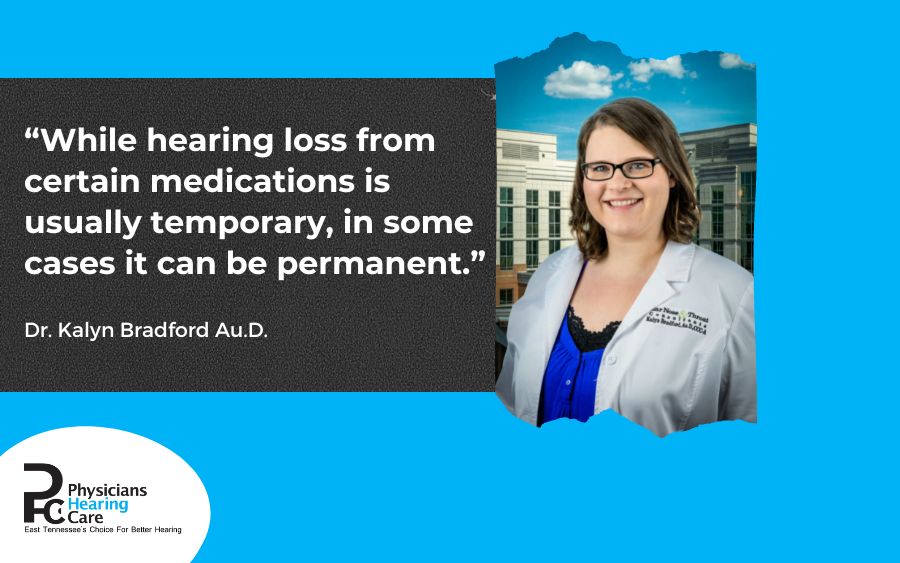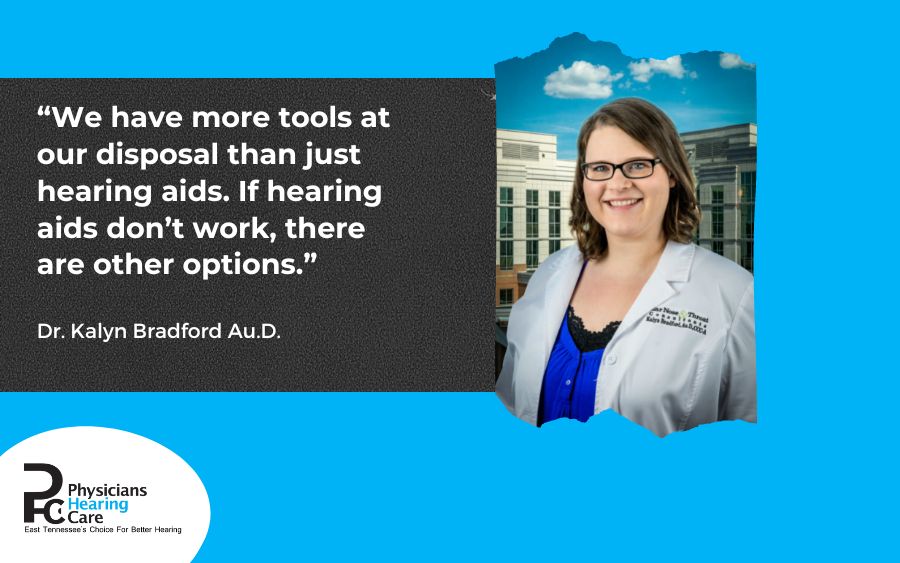If you have been having trouble hearing lately, it’s important to check and see if your medications are the cause. Many common medications can cause hearing loss, especially if they are taken for a long time.
According to the Mayo Clinic, there are more than 200 prescription and over-the-counter drugs that can cause hearing loss as a side effect. This type of hearing loss is usually temporary, but in some cases, it can be permanent.
Physician Hearing Care’s goal is to always maximize your hearing health, and there are measures you can take to prevent your medication from robbing you of your hearing.
In this blog post, we will discuss the most common medications that can lead to hearing loss (ototoxic medications) and what you can do about it.
Is Your Medication Causing Hearing Loss?
If you think your medication is causing hearing loss, there are a few signs to look out for. These include:
- Muffled sounds, or it sounds like people are mumbling, especially certain letters in speech, like p and d
- Needing the volume turned up on the TV, radio, or phone
- Difficulty understanding speech, especially if you’re in a loud environment
- Asking most people to repeat themselves
- Withdrawal from social situations because of the effort of trying to understand every word said
- Ringing in the ears (tinnitus)
If you have only noticed one or more of these since you started taking a different medication, or if you’ve been on one for a long time, it may be the medication causing the hearing loss.
Common Medications Linked to Hearing Loss
One way to start assessing the cause of your hearing loss is to see if any of your current medications are on the list below.
- Antibiotics:
- Aminoglycosides are a type of antibiotic used to treat bacterial infections, and they can be given intravenously (IV) or intramuscularly (IM). Common aminoglycosides include neomycin, streptomycin, and tobramycin.
- Other antibiotics that can cause temporary or permanent hearing loss include erythromycin, azithromycin, chloramphenicol, and vancomycin.
- Over-the-counter painkillers:
- Aspirin is a medication that is used to treat pain, fever, and inflammation. It is available over the counter and is also one of the active ingredients in many cold medicines. The risk of hearing loss increases with high doses (15mg+) or long-term use of aspirin, and aspirin can also cause tinnitus.
- Acetaminophen, taken daily, carries a 21% increased risk of hearing loss.
- Ibuprofen and naproxen can cause a 25% increased risk of hearing loss and tinnitus if they are taken daily.
- Certain diuretics: Diuretics are medications that help the body get rid of excess water and salt. They are often used to treat high blood pressure and heart failure. Examples of diuretics that have been linked to temporary hearing loss include ethacrynic acid (Edecrin) and furosemide (Lasix), with the risk being quite low unless they are administered at the same time as other medications such as gentamicin or cisplatin.
- Viagra and other ED drugs: These PDE-5 inhibitors have a 03% risk of causing sudden hearing loss or deafness.
- Platinum-based chemotherapy agents: These agents are used to treat cancer. They include cisplatin, nelomycin, and carboplatin. They can cause both temporary and permanent hearing loss. Fortunately, new drugs are now starting to be available to reduce cisplatin’s ototoxicity.
- Quinine and hydroxychloroquine: Prescribed as an anti-malarial or anti-viral measure, these medications can cause temporary hearing loss and tinnitus.
- Most antidepressants: Most antidepressants carry the risk of causing sudden sensorineural hearing loss, with some being more ototoxic than others.
- Biologics: Biologics are chemically synthesized drugs that are often used when a person has become insensitive to all other medications. According to the FDA, they are used in “vaccines, blood and blood components, allergenic, somatic cells, gene therapy, tissues, and recombinant therapeutic proteins.” One study states that dasatinib, interferon, muromonab, and pembrolizumab can affect both hearing and balance, and erlotinib can cause cochlear toxicity.
It is important to be aware of the potential side effects of all medications that you take. If you are taking any medication – prescription or over the counter – and you experience hearing loss or ringing in the ears, it is important to talk to your doctor or audiologist right away to protect against any further hearing damage.
While hearing loss from certain medications is usually temporary, in some cases, it can be permanent.
If you are on a mix of medications, the risk of hearing loss is higher. Look up your prescribed medications and home remedies on the Mayo Clinic’s Drugs and Supplements list or Drugs.com Drug Side Effects checker to see if taking them together could be causing hearing loss, tinnitus, or any other unwelcome side effect.
But in addition to this online research, consult our audiologists at Physician Hearing Care for expert guidance.
Find Help for Medication-Caused Hearing Loss in East Tennessee
PHC Tennessee has a team of eleven clinical audiologists, and we are ready to help assess your degree of hearing loss and find the cause.
The first step is to have your hearing professionally evaluated at one of our five locations, and you can schedule a hearing assessment via our online form or by calling us.
We look forward to helping you figure out what’s causing your hearing loss and helping you find the best hearing solution as soon as possible, so you can move forward with the best hearing possible.





